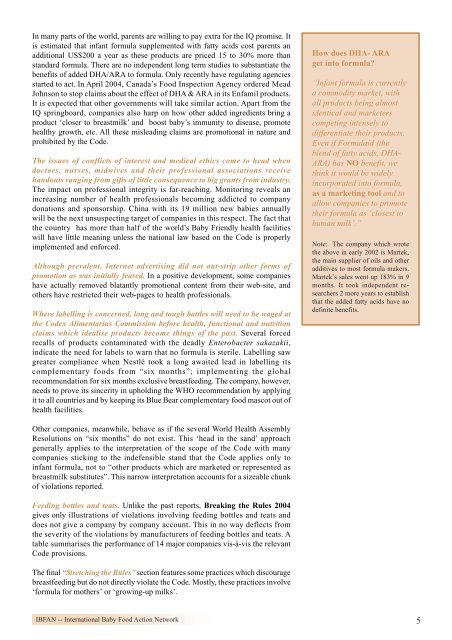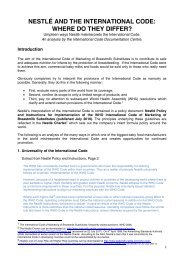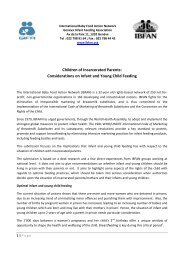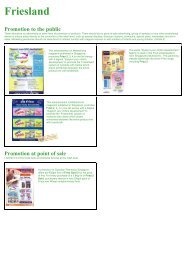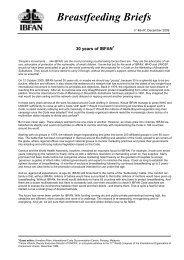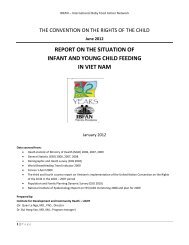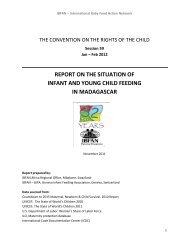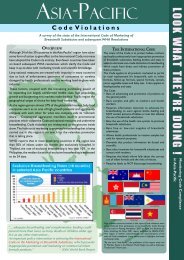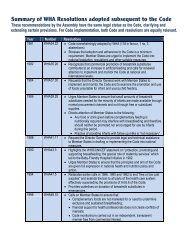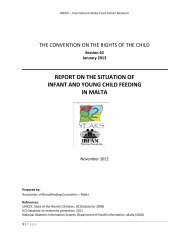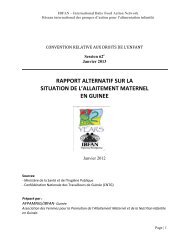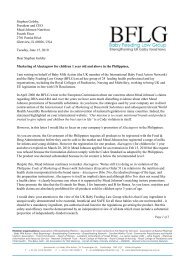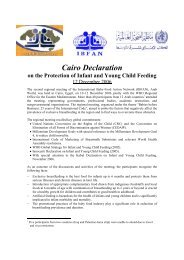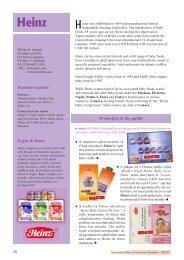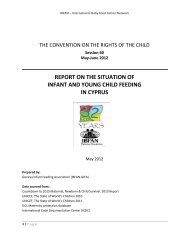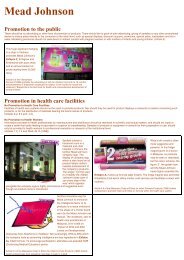You also want an ePaper? Increase the reach of your titles
YUMPU automatically turns print PDFs into web optimized ePapers that Google loves.
In many parts of the world, parents are willing to pay extra for the IQ promise. It<br />
is estimated that infant formula supplemented with fatty acids cost parents an<br />
additional US$200 a year as these products are priced 15 to 30% more than<br />
standard formula. There are no independent long term studies to substantiate the<br />
benefits of added DHA/ARA to formula. Only recently have regulating agencies<br />
started to act. In April 2004, Canada’s Food Inspection Agency ordered Mead<br />
Johnson to stop claims about the effect of DHA & ARA in its Enfamil products.<br />
It is expected that other governments will take similar action. Apart from the<br />
IQ springboard, companies also harp on how other added ingredients bring a<br />
product ‘closer to breastmilk’ and boost baby’s immunity to disease, promote<br />
healthy growth, etc. All these misleading claims are promotional in nature and<br />
prohibited by the Code.<br />
The issues of conflicts of interest and medical ethics come to head when<br />
doctors, nurses, midwives and their professional associations receive<br />
handouts ranging from gifts of little consequence to big grants from industry.<br />
The impact on professional integrity is far-reaching. Monitoring reveals an<br />
increasing number of health professionals becoming addicted to company<br />
donations and sponsorship. China with its 19 million new babies annually<br />
will be the next unsuspecting target of companies in this respect. The fact that<br />
the country has more than half of the world’s Baby Friendly health facilities<br />
will have little meaning unless the national law based on the Code is properly<br />
implemented and enforced.<br />
Although prevalent, Internet advertising did not out-strip other forms of<br />
promotion as was initially feared. In a positive development, some companies<br />
have actually removed blatantly promotional content from their web-site, and<br />
others have restricted their web-pages to health professionals.<br />
Where labelling is concerned, long and tough battles will need to be waged at<br />
the Codex Alimentarius Commission before health, functional and nutrition<br />
claims which idealise products become things of the past. Several forced<br />
recalls of products contaminated with the deadly Enterobacter sakazakii,<br />
indicate the need for labels to warn that no formula is sterile. Labelling saw<br />
greater compliance when Nestlé took a long awaited lead in labelling its<br />
complementary foods from “six months”; implementing the global<br />
recommendation for six months exclusive breastfeeding. The company, however,<br />
needs to prove its sincerity in upholding the WHO recommendation by applying<br />
it to all countries and by keeping its Blue Bear complementary food mascot out of<br />
health facilities.<br />
Other companies, meanwhile, behave as if the several World Health Assembly<br />
Resolutions on “six months” do not exist. This ‘head in the sand’ approach<br />
generally applies to the interpretation of the scope of the Code with many<br />
companies sticking to the indefensible stand that the Code applies only to<br />
infant formula, not to “other products which are marketed or represented as<br />
breastmilk substitutes”. This narrow interpretation accounts for a sizeable chunk<br />
of violations reported.<br />
Feeding bottles and teats. Unlike the past reports, Breaking the Rules 2004<br />
gives only illustrations of violations involving feeding bottles and teats and<br />
does not give a company by company account. This in no way deflects from<br />
the severity of the violations by manufacturers of feeding bottles and teats. A<br />
table summarises the performance of 14 major companies vis-à-vis the relevant<br />
Code provisions.<br />
The final “Stretching the Rules” section features some practices which discourage<br />
breastfeeding but do not directly violate the Code. Mostly, these practices involve<br />
‘formula for mothers’ or ‘growing-up milks’.<br />
<strong>IBFAN</strong> -- International Baby Food Action Network<br />
How does DHA- ARA<br />
get into formula?<br />
“Infant formula is currently<br />
a commodity market, with<br />
all products being almost<br />
identical and marketers<br />
competing intensely to<br />
differentiate their products.<br />
Even if Formulaid (the<br />
blend of fatty acids, DHA-<br />
ARA) has NO benefit, we<br />
think it would be widely<br />
incorporated into formula,<br />
as a marketing tool and to<br />
allow companies to promote<br />
their formula as ‘closest to<br />
human milk’.”<br />
Note: The company which wrote<br />
the above in early 2002 is Martek,<br />
the main supplier of oils and other<br />
additives to most formula makers.<br />
Martek’s sales went up 183% in 9<br />
months. It took independent researchers<br />
2 more years to establish<br />
that the added fatty acids have no<br />
definite benefits.<br />
5


